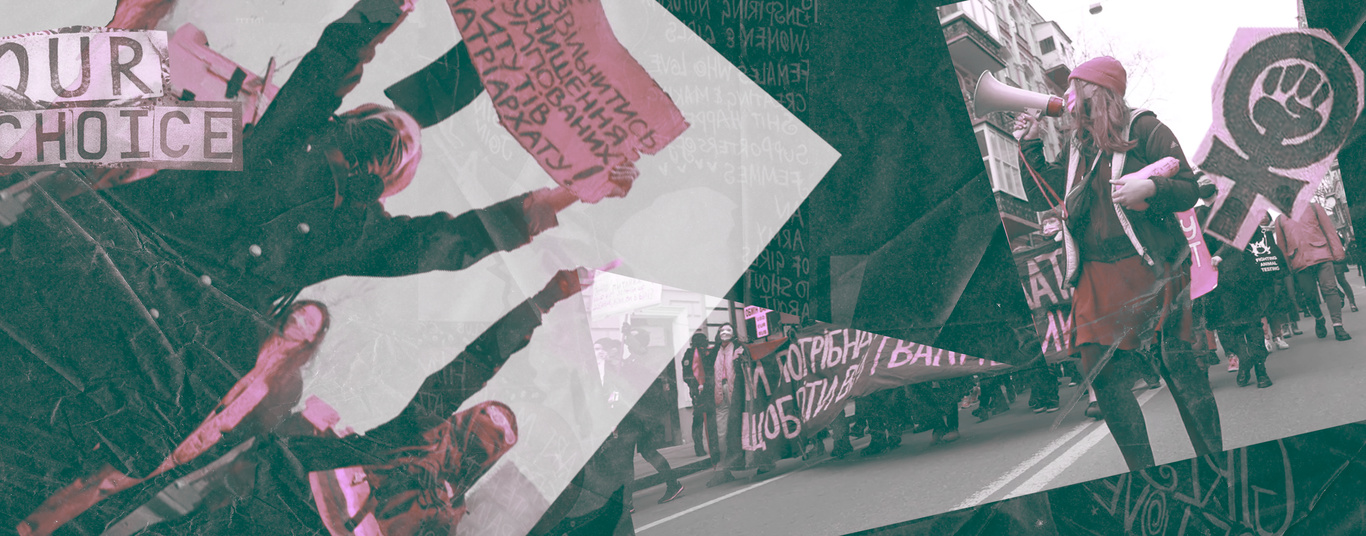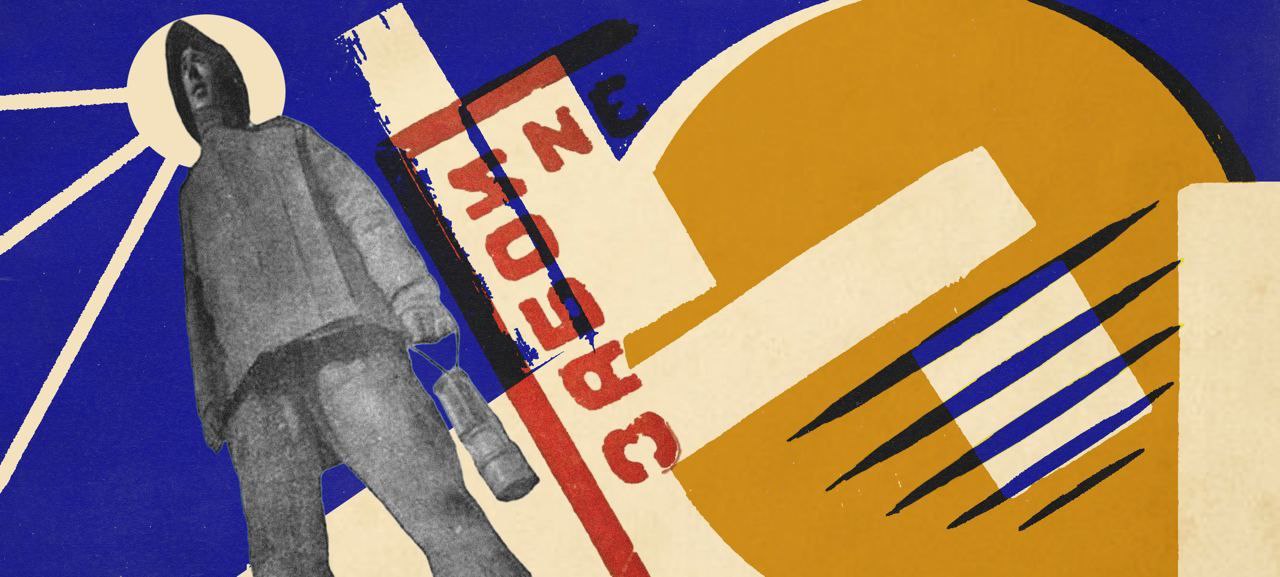In the middle of February, a draft law was uploaded on the Parliament website, calling to cancel the celebrations of March 8, introducing instead the Day of a Ukrainian woman. Referencing economic losses from March 8 being a national holiday and the need “to part with Soviet legacy”, politicians gracefully ignore the political significance of the day that brings attention to the fight for women’s rights.
For many years Ukrainian feminists have fought for the political, economic, and personal rights and opportunities of women. They have turned the spotlight on gender-based violence, the gender pay gap, and the devaluation of reproductive labor. In no way have these problems disappeared amidst the war and crises: on the contrary, they increased and created yet new challenges for the feminist movement.
We talked to grassroots activists to learn about women’s status in wartime, problems and challenges the feminist movement faces, and threats that may become relevant for Ukrainian society once the war will be over.
How does war affect gender inequality?
One of the harshest problems Ukrainian society faced after February 24 of 2022 is sexual violence perpetrated by Russian soldiers.
“Ukrainian women are under constant threat of such war crimes like sexual violence. We can only imagine what is happening in the occupied territories,” says the member of “Feminist workshop” Anastasia Yurchenko.
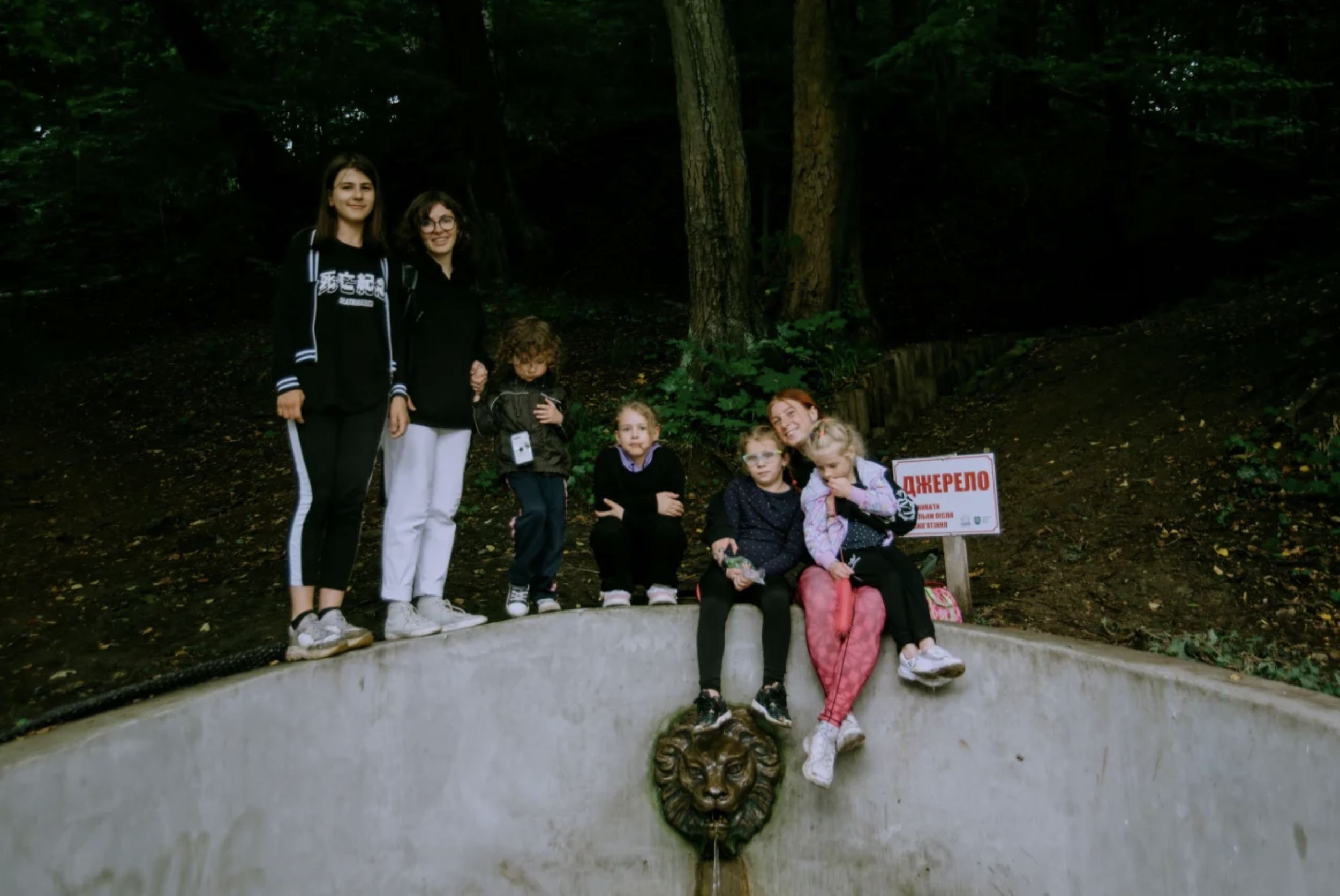
Activists of the "Feminist Workshop" and children from the shelter during an excursion to the Nursery space. Photo Credit: Feminist Workshop Facebook | Tanya Jafarova
In addition to the direct physical dangers of shellings and violence, the war leads to harsh socio-economic ramifications. Near the front line, the population often ends up on the brink of a humanitarian catastrophe, but the problems get exacerbated everywhere. Vulnerable populations are the first to suffer from them, as the funding of the social sphere is being cut.
“Lowering the wages in the state sector affects women who comprise a huge part of state employees on different levels (nurses, doctors, teachers, bureaucrats). Lack of money for kindergartens means an additional burden for women. In the absence of funding certain programs against violence may be curtailed, etc.,” Anastasia explains.
Activist of the initiative “Bilkis” Yana also emphasizes that war exacerbates economic inequality: it increases the burden on the care sector, which is mainly composed of women. There are women who get the heaviest load of underpaid or unpaid reproductive labor put on their shoulders.
“The majority of household chores fall to women. If there is no gas, electricity, water, and heat, they face challenges: how to wash a baby, cook a meal, tidy the apartment, and so on,” Yana believes.
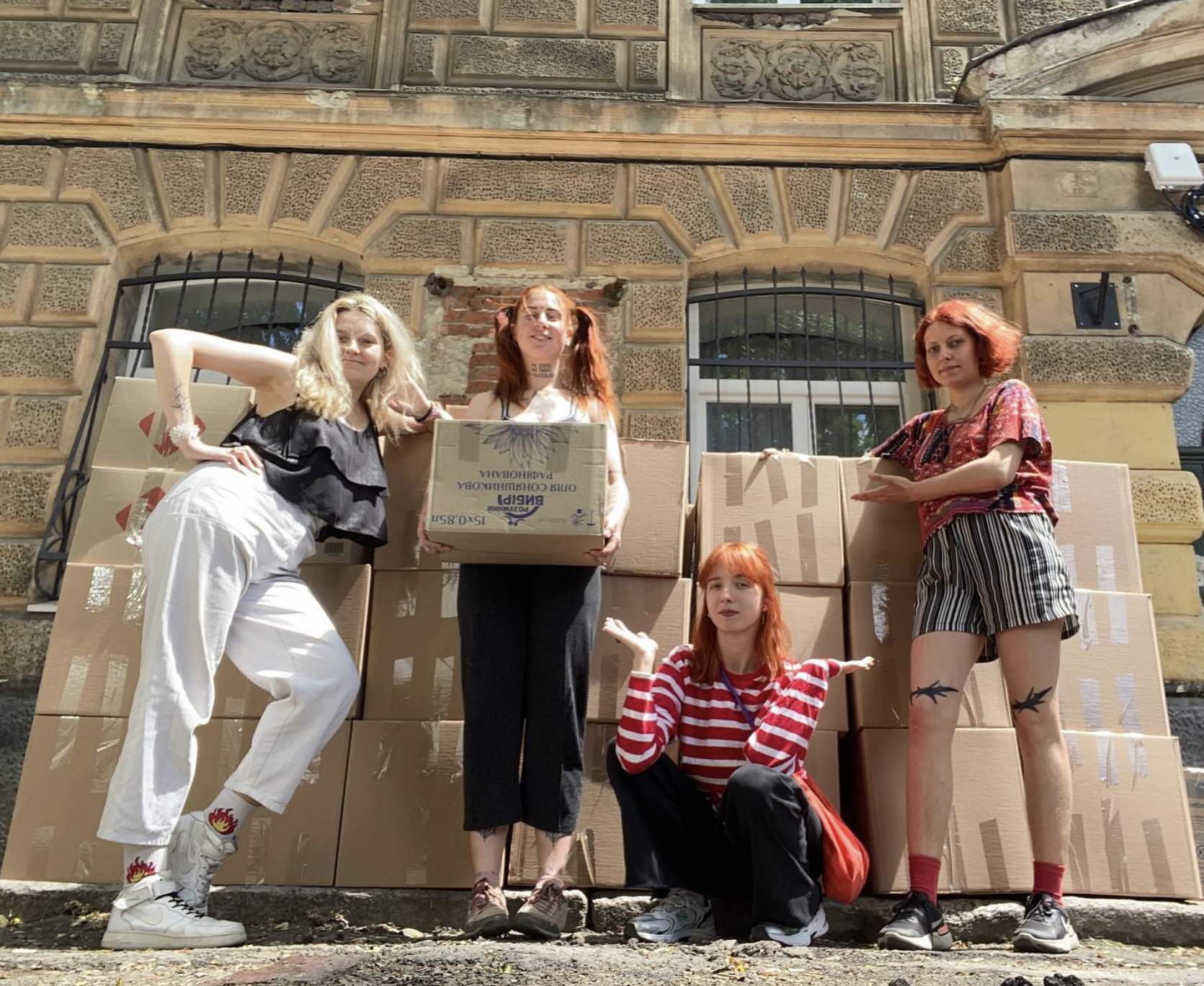
“Bilkis” activists have been active in humanitarian aid since the first weeks of the full-scale invasion. Photo: “Bilkis” Facebook
Amidst these problems optimistic legislative changes take place as well – the ratification of the Istanbul convention that took Ukrainian feminists years of fighting, and the intensification of work regarding the UN resolution “Women. Peace. Security”.
“Looking at the national level, we understand that European integration becomes a positive influence and leverage for the state. They can no longer ignore the issue of gender equality,” says Anastasia Chebotaryova, a member of “Feminist lodge”.
UN resolution 1325 “Women. Peace. Security”, Anastasia believes, is of great importance during the war:
“This resolution is significant since it recognizes that the war affects men and women differently and focuses on security measures, countering violence, and inclusion of women in the peacemaking process. Ukraine was the first country to ratify 1325 in wartime. The full-scale invasion became the impetus to update the National action plan. Earlier women, peace, and security were mainly on the agenda of activists and government in the eastern and central regions of Ukraine, but now we see new coalitions emerging in all Ukrainian regions,” the activist concludes.
Alisa Shampanska from the initiative “Femsolution” also sees positive changes in the increase in the visibility of women in the Ukrainian Armed Forces and the usage of feminine forms of nouns on the state level.
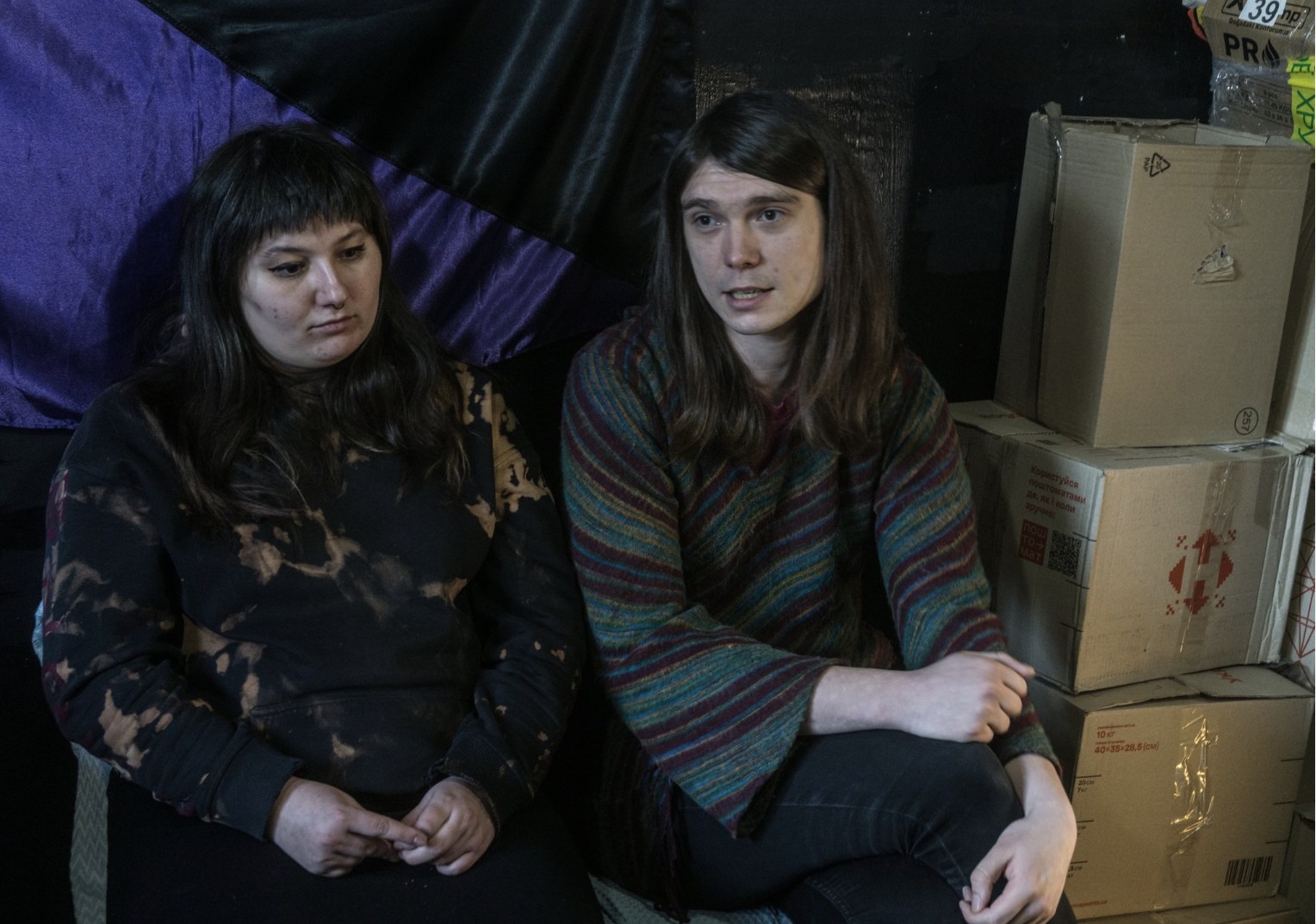
"FemSolyushn" activists collect humanitarian aid / Photo: Ivan Zayets
What are the post-war prospects for the feminist movement?
Human rights advocate and head of the center “Women’s perspectives” Marta Chumalo identifies four threats that may become relevant in the near future. First and foremost, there is an attack on reproductive rights. She believes that chances are, there will be attempts to prohibit abortions appealing to losses on the battlefront and deaths caused by shellings, as well as to Ukrainian women fleeing abroad. Another threat is the strengthening of the far-right discourse that traditionally goes hand in hand with attacks on women's rights. The radicalization of nationalism is a frequent consequence of wars. There may be a surge of domestic violence, caused by men returning from the battlefront psychologically traumatized. There is also the risk that key decisions regarding recovery and reconstruction on the highest level will be made chiefly by men.
Anastasia Chebotareva agrees that the needs of women and girls may get ignored during post-war reconstruction processes:
“It will be relevant for the reconstruction of cities, care infrastructure, and critical infrastructure. It is crucial to already begin looking for ways to get included in the process. NGOs and funds have an opportunity to enlist the support of their international partners,” the activist says.
Ukrainian society is already in need of effective rehabilitation programs for the veterans helping to cope with both physical and psychological traumas:
“Establishing and setting up the system of rehabilitation and help is a major challenge. Feminist movement may participate in it as well,” Alisa Shampanska believes.
Marta Chumalo points out the threat of strengthening both men’s and women’s traditional gender roles in society:
“Behaviour falling out of the frame defined by these two norms is often not approved by other people. Be it men avoiding the mobilization or women affected by domestic violence by demobilized men asking for help — they face condemnation and a lack of understanding. That, in turn, widens gender gaps”.
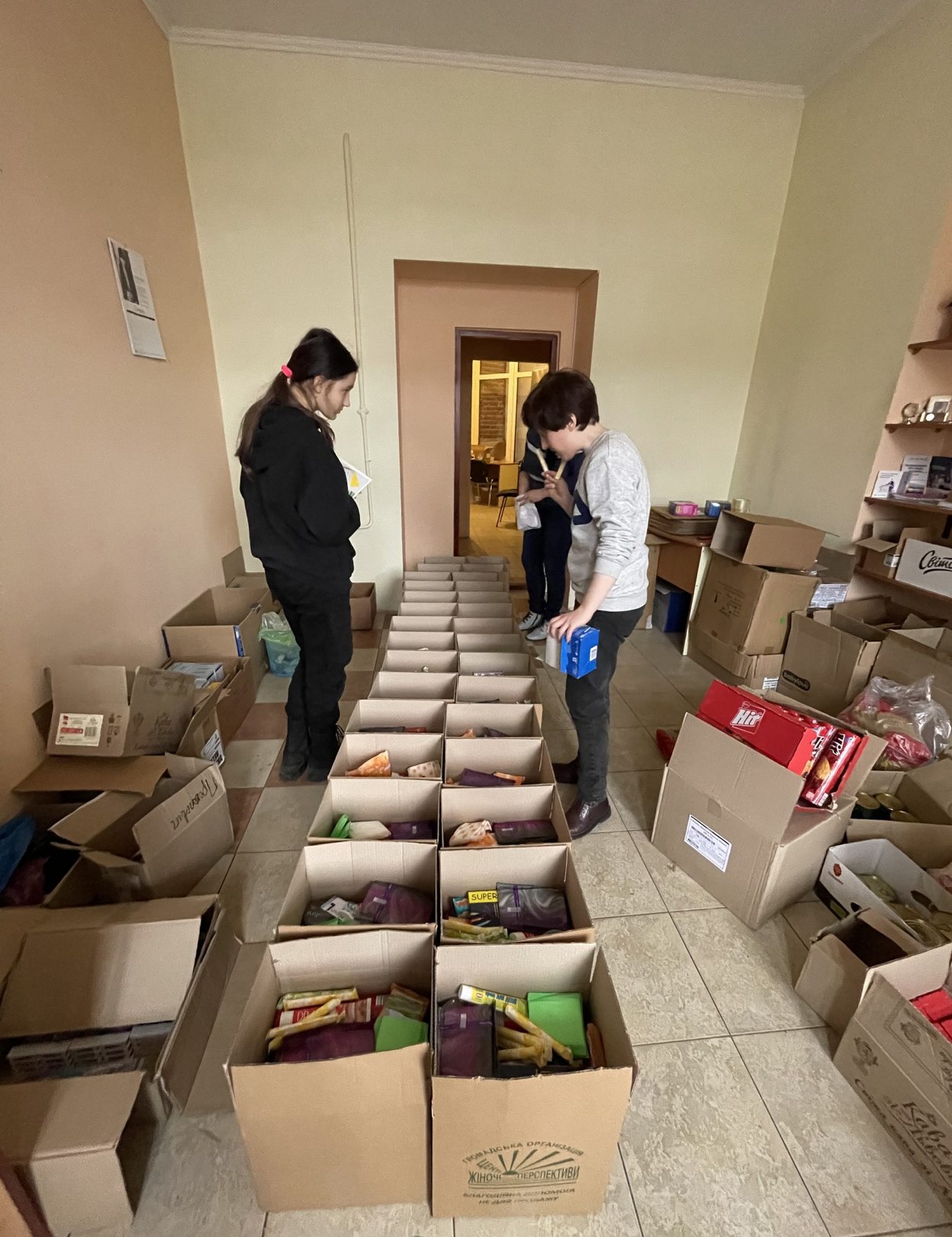
Residents of the shelter, organized by "Women's Perspectives", are engaged in volunteering and help form food kits as part of the "Woman for Women" project. Photo: "Women's Perspectives" Facebook
Which feminist practices became impossible due to war, and what emerged in their place?
According to the activists, since the beginning of the full-scale invasion, the majority of feminist initiatives launched humanitarian relief campaigns, slightly shifting the focus of their activities. For instance, the center “Women’s perspectives” has already established seven shelters for women belonging to vulnerable populations: internally displaced elderly women, women with mental disorders, mothers with many children, disabled women, and women affected by gender-based violence. The initiative “Feminist lodge” also heavily focuses on the provision of humanitarian aid.
“Often this is about hard-to-reach locations that no great humanitarian fund will reach — villages, temporarily occupied territories, and areas close to the front line. We established an extensive network of volunteers and partners — in Kramatorsk, Kherson, Zaporizhzhya and Zapozizhzya region, and in the Kharkiv region,” tells Anastasia Chebotareva.
Activist Ivanka from the initiative “Bilkis” also points out that their activities are mainly aimed at low-income and homeless people:
“We are currently working on two socially oriented projects. One is “Space of things”, where you can bring something no longer necessary or take something you need. “Bird feeder” is about feeding low-income or homeless people. We are an intersectional feminist initiative, and that’s what makes us believe that gender inequality intersects with other kinds of inequality, for instance, financial. We are also planning to organize a series of movie screenings about women and war and make educational tiktoks on feminism in Ukraine”.
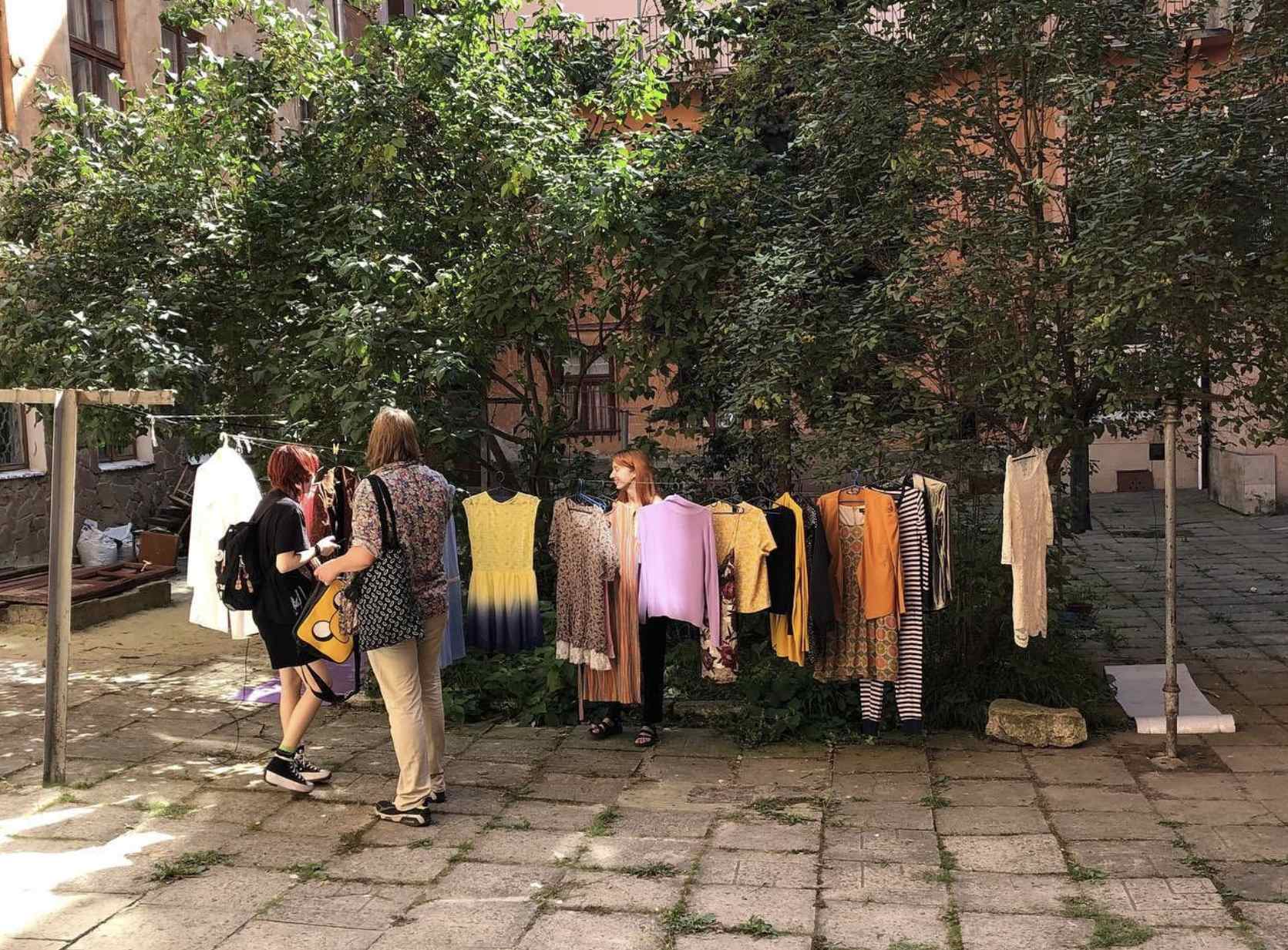
"Bilkis" activists organized a social project of mutual support "Space of things" in Lviv, where everyone can take clothes and other things for free. Photo: "Bilkis" Facebook
So, engaging in humanitarian aid doesn’t mean that feminists ceased to speak up on the issues of gender inequality. On the contrary, it is by helping people that they can expand their audience. Alisa Shampanska also tells how “FemSolution” combines humanitarian and educational activities:
“Now our main activities in that area are an informational influence on our audience on social media. We provide humanitarian aid to women and their families, and people subscribe to our media because they want to receive help, not because of their feminist views. That’s why after a while we began creating educational pictures: for instance, we participated in the campaign “16 days against violence" and convinced people to vote on Diya to keep March 8 the state holiday, in order to be able to keep going on protests.”
Activists that fled abroad and are advocating for the needs of the Ukrainian community provide great support:
“I am currently based abroad, and my main activity is searching for international solidarity, spreading truthful information, and fighting propaganda. Over this year I have remotely worked with different communities inside the country, with my activities ranging from searching for and securing financial help to the organization of closed events focusing on reflections,” shares the activist of “Social movement” Valeriya Zubatenko.
Solidarity and cooperation – in Ukraine and abroad
The majority of feminists agree that since the beginning of the full-scale invasion, the ties between grassroots feminist collectives have gotten stronger.
“We are establishing a shelter or a humanitarian program — we contact more experienced activists and receive consultations and help. Say, we need diapers for children in a shelter — we write to the activist chats — we find what is needed,” Anastasia Yurchenko shares her experience.
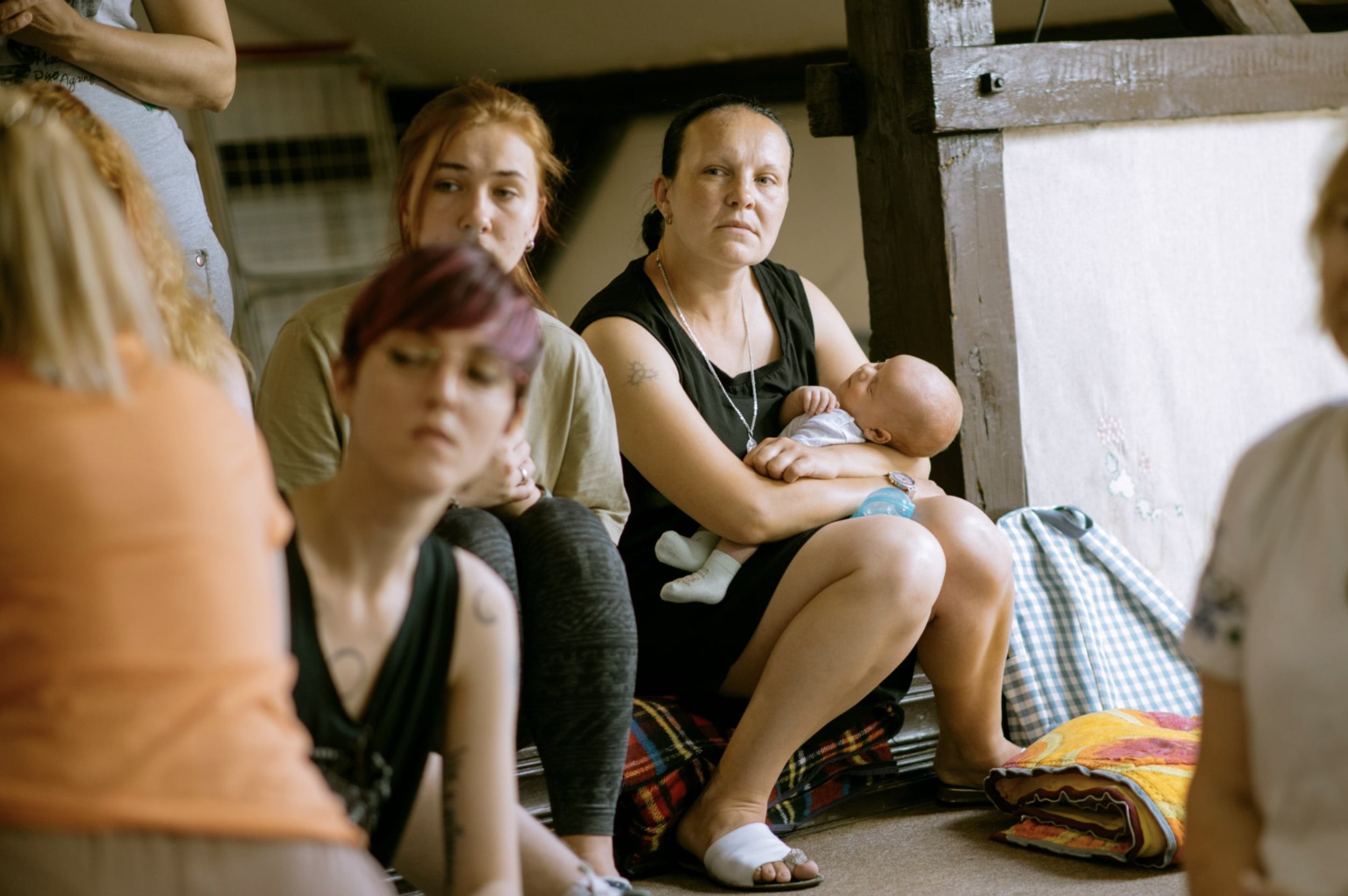
On June 25, the "Feminist Workshop" shelter for women* and children was officially opened in Lviv. Photo: Facebook "Feminist Workshop"
There are dozens of examples of cooperation between different movements that are not limited to feminists’ joint efforts but include other civil activists and the LGBT+ community. The activist believes that society showed many positive cases that include high-profile discussions on violence against women and objectification, women’s status in the army, and a powerful volunteer movement that includes feminists. On the other hand, the activist shares stories of hostile attitude from the representatives of municipal authorities.
"Conservative deputy exertеd pressure on our organization, he aggressively interfered with our work. Unfortunately, the authorities didn’t offer any adequate solution regarding the problem,” Anastasia shares.
Anastasia Chebotaryova stresses that grassroots Ukrainian feminists got significantly more attention from the international community.
“We get invitations to the conferences, we become the heroines of the articles, and we have opportunities to go to exchange and study programs. That’s what makes me believe that we have all chances to be proactive at responding to the challenges that our ideological opponents are preparing”.
Zhenya from “Bilkis” also mentions material aid from European feminists:
“In summer we were visited by French feminists, they gave us some important things for our office and helped us with donations. Other European activists also sent us humanitarian aid and office equipment”.
At the same time, many activists mentioned the manifesto “Feminist resistance against war” in which foreign activists and academics spoke out against sending weapons to Ukraine. Among the challenges that the feminist movement faced when searching for solidarity, Valeriya Zubatenko recalls the fact that some part of Western Left doesn’t realize their safety privilege.
“Whereas in Ukraine, for a whole year we've been showing not telling feminism and antifascism, in the West, these same problems still remained a subject of lengthy debates: instead of raising funds for the humanitarian effort, they’ve been pondering whether to send arms to Ukraine. As we were searching for solidarity with Western Left, it has become a challenge”.
As opposed to problematic statements voiced by certain Western feminists, the initiative group of Ukrainian activists came up with the manifesto “Right to resist”. This call was signed by over 900 activists and 70 collectives from all over the world, which proves Ukrainian feminists receive a great deal of support.
Since the beginning of the war, significant changes have happened in Ukrainian society as well. Marta Chumalo says that the levels of mutual support and sensitivity to the needs of feminists from the different Ukrainian regions greatly increased, as well as the amount of cooperation, solidarity and support coming from foreign feminists.
“Feminism ideology is becoming a trend. Many women identify as feminists now, even though before they didn't".
In the end, we suggested that the activists pick out slogans if there was a women's rights march today. These slogans could be on their protest posters:

Іnscription on the poster: "The fight is always on time"
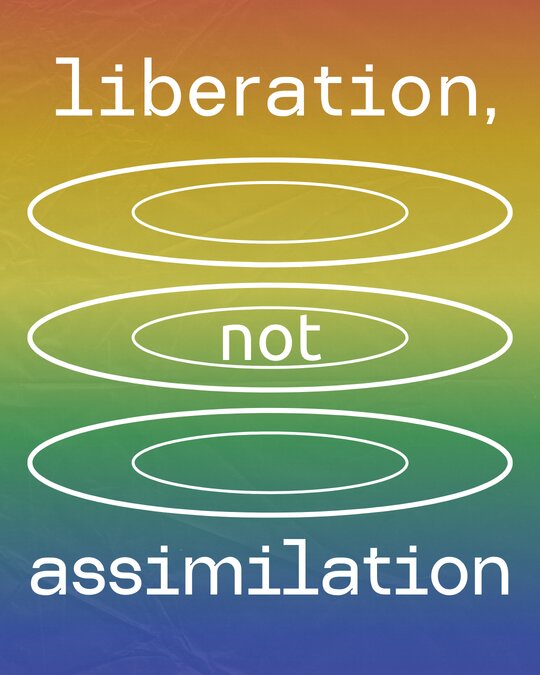
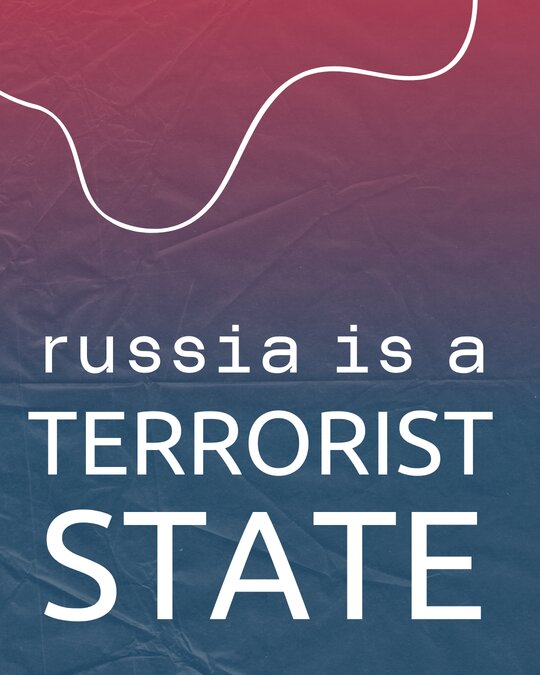
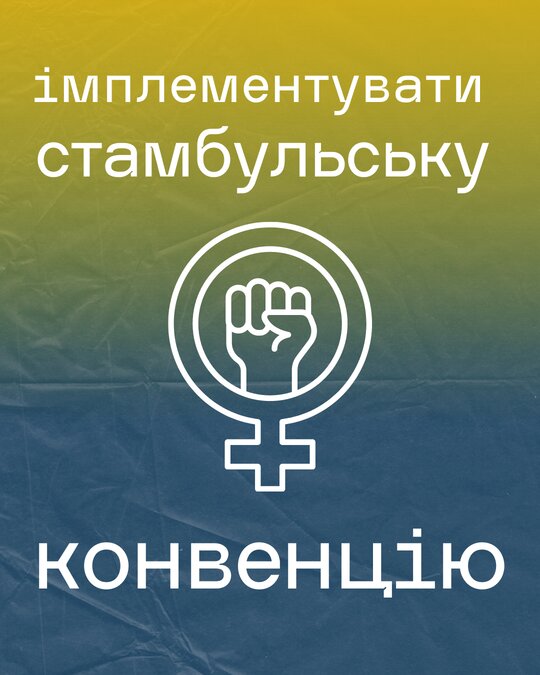
Inscription on the poster: "Implement the Istanbul Convention"
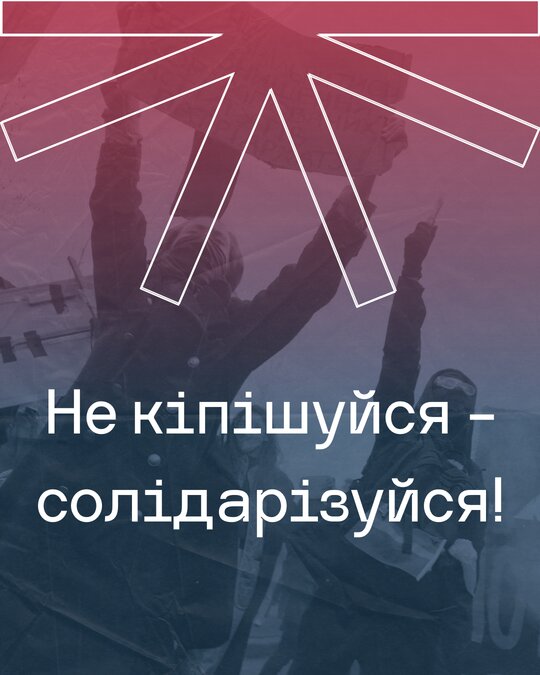
Inscription on the poster: "Don't get angry – stand in solidarity"
Author: Kateryna Turenko
Translated by Kira Leonova
Cover and poster design: Kateryna Gritseva
